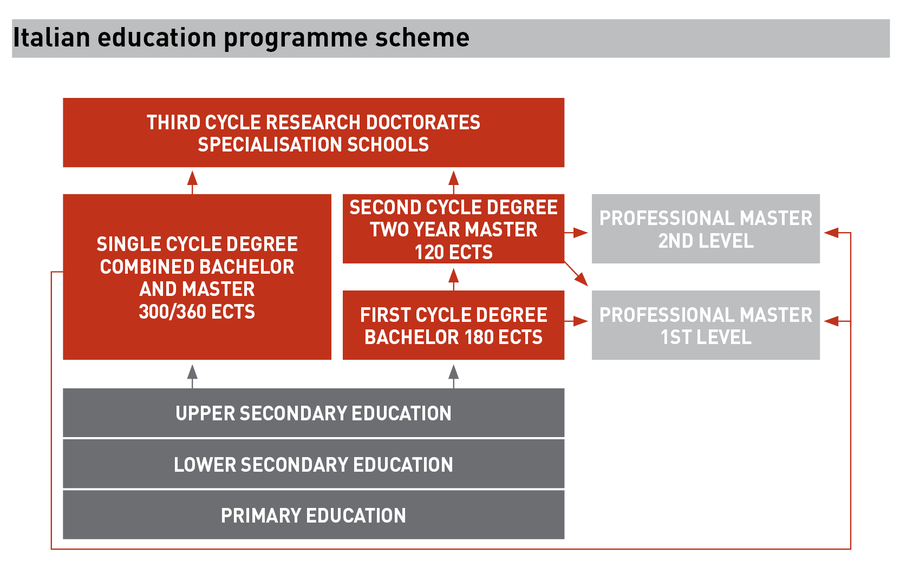
University studies are organised in cycles, and a high-school diploma or degree is required to enrol, depending on the cycle chosen.
First cycle Degree (qualification required: high-school diploma)
- Cycle: first
- Duration: 3 years
- Credits: 180 credits must be obtained. Each credit (CFU) quantifies the work required to acquire skills and is equivalent to approximately 25 hours of commitment. Credits may be awarded for further studies.
- Number of exams and tests: maximum 20.
- Academic qualification: Graduate student (Dottore/Dottoressa)
- Goal: to guarantee a general knowledge of the basic and characterising disciplines, also with a view to vocational training to facilitate entry into the world of work, by training precise professional figures.
- It allows you to continue your studies with:
First Cycle Degree Programmes are grouped into 43 ministerial classes (with 4 additional ones for degrees in the health professions) based on common educational goals. First Cycle Degree Programmes in the same class have equal legal value, although study pathways can differ thanks to the independent choice of elective subjects.
Second cycle degree/Two-year Master's Degree (qualification required: First cycle degree)
- Cycle: Second
- Duration: 2 years.
- Credits: 120 credits must be obtained. Each credit (CFU) quantifies the work required to acquire skills and is equivalent to approximately 25 hours of commitment. Credits may be awarded for further studies.
- Number of exams and tests: maximum 12.
- Academic qualification: Postgraduate student (Dottore/Dottoressa)
- Goal: to provide advanced training for performing highly qualified activities in specific fields.
- It allows you to continue your studies with:
Second Cycle Degree Programmes are grouped into 94 ministerial classes (with 4 additional ones for degrees in the health professions) based on common educational goals.
Second Cycle Degree Programmes in the same class have equal legal value, although study pathways can differ thanks to the independent choice of elective subjects.
Single cycle Degree Programme (qualification required: High school diploma)
- Cycle: Single
- Duration: 5 or 6 years.
- Credits: for 5-year courses, 300 credits. For 6-year programmes, 360 credits. Each credit (CFU) quantifies the work required to acquire skills and is equivalent to approximately 25 hours of commitment. Credits may be awarded for further studies.
- Number of exams and tests: for 5-year courses, maximum 30. For 6-year programmes, maximum 36.
- Academic qualification: Postgraduate student (Dottore/Dottoressa)
- Goal: to provide advanced training for working in regulated professions and performing highly qualified activities.
- It allows you to continue your studies with:
Single cycle programmes are grouped into 8 ministerial classes based on common educational goals. The Degree Programmes in the same class have equal legal value, although study pathways can differ thanks to the independent choice of elective subjects.
PhD programme degrees (qualification required: Second or Single Cycle Degree)
- Cycle: Third
- Duration: PhD programmes 3 or 4 years
- Academic qualification: Doctor of philosophy (Dottore di ricerca/Dottoressa di ricerca)
- Goal: to prepare for advanced scientific research methodology by providing internships abroad and attendance of research laboratories.
Specialisation schools (qualification required: Second or Single Cycle Degree)
- Cycle: Third
- Duration: defined by the programme teaching regulations.
- Academic qualification: Specialist (in Italy)
- Goal: to provide knowledge and skills to become specialists in certain professional fields and to obtain a licence to practice these professions.
First Level Professional Masters programmes (qualification required: First-, Second-, Single-Cycle Degree)
Duration: 1 year
Credits: 60 credits must be obtained. Each credit (CFU) quantifies the work required to acquire skills and is equivalent to approximately 25 hours of commitment.
Qualification: no qualification
Goal: to further studies and acquire high-level professional skills
Second Level Professional Masters programmes (qualification required: Second or Single Cycle Degree)
Duration: 1 year
Credits: 60 credits must be obtained. Each credit (CFU) quantifies the work required to acquire skills and is equivalent to approximately 25 hours of commitment.
Qualification: no qualification
Goal: to further studies and acquire high-level professional skills
See also
Contacts
URP Ufficio Relazioni con il Pubblico
Staff:
Valentina Filippi (responsabile)
Enrico Bresciani
Chiara Mazzotti
Alessandra Zambelli
Anna Bandiera
Vincenza Ferraro
PEC of the University of Bologna scriviunibo@pec.unibo.it (receives only from PEC boxes)
Address
Largo Trombetti 1 - 40126 Bologna
Office hours
Tuesday 10.00 - 13.00 and 14.30 - 16.00
Wednesday 10.00 - 13.00
Thursday 14:30 - 16:00
Friday 10:00 - 13:00
Reception:
Monday and Friday 9:00 - 10:00
Telephone
+39 051 2080310Fax
+39 051 2086224
